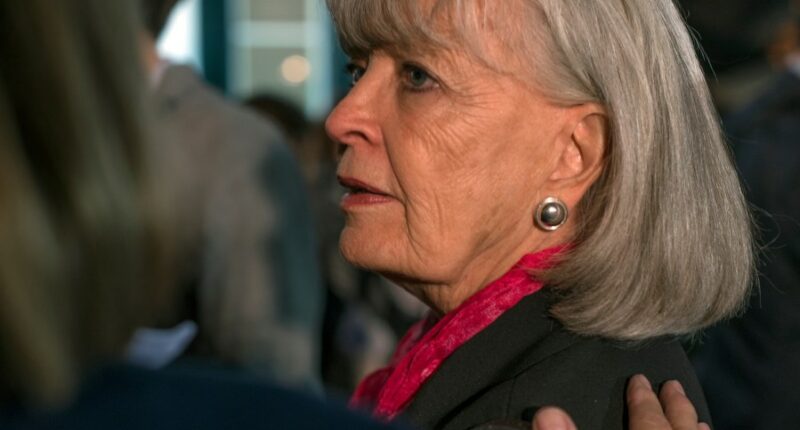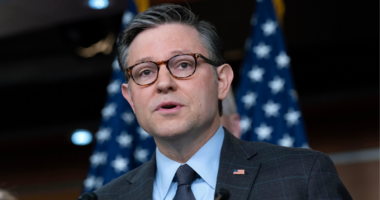Share this @internewscast.com

Martha Layne Collins, a trailblazer in Kentucky’s political landscape as the first and only woman to serve as the state’s governor, passed away on Saturday at the age of 88. Her tenure as governor, from 1983 to 1987, was marked by significant strides in economic and educational reform.
Among her most notable achievements was the establishment of a massive Toyota auto assembly plant, a pivotal development in Kentucky’s industrial growth during her administration. This project was a cornerstone of her broader economic development strategy, aimed at invigorating the state’s economy.
Collins, who began her career as a teacher, was deeply committed to education reform. In a 1992 interview with the Nunn Center for Oral History at the University of Kentucky, she reflected on her priorities, noting, “When I became governor, you have lots of priorities, but when I’d sit down and think about it, education always came back as the first thing you have to start with.” She expressed pride in having made a significant impact on education and job creation, hoping to uplift the people of Kentucky in the process.
Her passing was announced by Governor Andy Beshear’s office, which lauded her as a “powerhouse” and celebrated her as “a remarkable woman who made an undeniable difference.” Her pioneering role as Kentucky’s first female governor was also recognized by Republican Senator Mitch McConnell, who acknowledged her for “breaking barriers” in a statement commemorating her legacy.
Gov. Andy Beshear’s office announced her death, calling her a “powerhouse” and “a remarkable woman who made an undeniable difference.”
Republican Sen. Mitch McConnell said in a statement that Collins “was known for breaking barriers” as the first Kentucky female governor.
“Governor Collins was a tireless advocate for all levels of education in Kentucky, and that passion carried her throughout her life,” McConnell said. “It is with deep sadness that Elaine (Chao) and I learned about Governor Collins’ passing, and we send our sincere condolences to her husband, Bill, and her two children.”
Kentucky Republican Attorney General Russell Coleman said that as the father of two daughters, he applauds her “service to Kentucky and busting through the glass ceiling to show that there are no limitations in our Commonwealth.”
Collins was in the national political spotlight in the summer of 1984 as chairwoman of the Democratic National Convention in San Francisco. She was interviewed by Walter F. Mondale, the party’s presidential nominee, as a possible running mate, but Mondale ultimately chose a different woman — Rep. Geraldine Ferraro of New York.
There was a cloud over Collins’ administration — her husband’s financial dealings — and it burst into a full-blown scandal with his indictment in July 1992.
As a witness at her husband’s trial, she presented an image of a governor blind to the exploitation of her office by her husband and a handful of campaign cronies who had been installed, at his insistence, in key positions. The former governor claimed she remained aloof from her husband’s business and was unaware the couple’s net worth increased 700% during her term.
“He was doing his business, and I was running government,” Collins said.
Bill Collins was ultimately convicted in 1993 for extorting money from underwriters who handled state bond issues.
At the Toyota plant’s groundbreaking in 1986, Collins said Kentucky had “entered a new age where we’ll be tied more closely to the global economy.” Kentucky had won a bidding war against other states for the plant, which at the time cost $800 million and employed 2,500 people to assemble Camry sedans. Parts suppliers and other car makers then sprouted in the state.
Her administration officially estimated the value of state incentives to the Japanese car maker, including the state’s purchase and development of the plant site, to be $125 million. But debt service on the necessary bond issues pushed the total over $300 million, critics said. And a Kentucky Supreme Court ruling was needed to declare that “giving” state land to a private company did not violate the state Constitution.
Collins, a native of Bagdad, a tiny crossroads town in Shelby County, seemed destined for a classically Middle American, largely anonymous life. As Martha Layne Hall, a funeral director’s daughter, she won a minor beauty pageant before graduating from the University of Kentucky in 1959, and taught at a junior high while her husband practiced dentistry.
She got her start in politics by mastering the thankless, grinding but indispensable art of precinct work. Later, she became active at state Democratic headquarters in Frankfort, and won her first elective office, a clerk of the Court of Appeals, in 1975. Four years later, she shocked many Democrats by winning the nomination for lieutenant governor. The state Republican party was weak at the time, so her primary victory was tantamount to election.
The lieutenant governor had few actual duties, but Collins cut innumerable ribbons as her husband and others raised money and nurtured the organization that would carry Collins to the statehouse.
The late governor’s son Steve Collins, reached by phone, declined comment but said he would have more to say later. Services are not yet complete, he said.
















